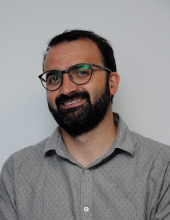Fernando López-Gallego, PhD in molecular biology, has joined CIC biomaGUNE as an Ikerbasque research professor. Dr. López-Gallego will lead the Heterogeneous Biocatalysis Laboratory at the research centre in Donostia-San Sebastián, where his work will be focused on the study of the coupling of enzymes with solid materials.
In CIC biomaGUNE, Fernando López-Gallego will work on his METACELL project, funded with a 2 million euro European Research Council (ERC) Consolidator Grant, to research over the next five years into the manufacture of artificial cells capable of converting renewable raw materials into high value-added products for the chemical industry. The project kicks off on 1 January 2020, and the research group is expected to increase initially to 10 people.
The Heterogeneous Biocatalysis Laboratory is also working on an EC FET-Open (Future and Emerging Technologies) project, within the framework of a consortium between Spanish, Austrian and German partner organisations. The project, entitled HOTZYMES, studies the coupling of enzymes to magnetic nanoparticles capable of remotely modulating their catalytic activity in the presence of magnetic fields.
Additionally, as from 1 January 2020, Fernando López-Gallego's research group will be further supported by a training network grant from the European Commission's Marie Sklodowska-Curie Actions Programme, designed to equip researchers with the skills and international experience required to develop a successful career both as an academic and in industry. This project, to be taken forward by a consortium of 10 academic institutions and 10 companies, all of them European, will provide training for a group of 20 young researchers of high potential in the field of applied biocatalysis, and will enable joint public-private doctorate studies to be undertaken in close collaboration between academic institutions and companies.
These three European projects share the line of research developed by Fernando López-Gallego, aimed at developing new enzymatic activities coupled with advanced materials that enable access to complex systems of chemical reactions of industrial interest. In this respect, the idea is to manufacture new multi-functional heterogeneous biocatalysts that enable complex molecules to be synthesized or degraded, depending on the specific application in question.
To achieve this objective, certain enzymes, which are merely proteins which act as catalysts, will be genetically modified to improve their uptake into solid materials, and the molecular interactions at the enzyme-material interface will be studied. This information is key to the further development and optimisation of immobilised enzymatic systems. Fernando López-Gallego's team is currently working on increasing the complexity of these systems, with the aim of mimicking the efficiency, selectivity and complexity of the intra-cell biosynthetic pathways.
These studies are key in biotechnology, as a large number of applications are based on coupling enzymes and materials. For example, most biosensors are based on immobilised enzymes in electrodes or solid sensor surfaces. Immobilised enzymes are also of major significance in the chemical industry, as they enable high value-added molecules to be synthesised in a highly efficient and sustainable way. Likewise, on an industrial level, immobilised enzymes make it possible to synthesise drugs such as penicillin-based antibiotics, food additives such as fructose syrups or glycerol-based moisturisers. Finally, immobilised enzymes also have a key role in water decontamination systems, eliminating different pollutants such as textile dyes or microplastics.
Fernando López-Gallego holds a PhD in molecular biology from the Autonomous University of Madrid. He did his doctoral thesis at the Institute of Catalysis and Petrochemistry of the CSIC in Madrid, under the supervision of Prof. Guisán and Prof. Fernández-Lafuente. Subsequently, he conducted postdoctoral studies at the University of Minnesota (2007-2010, Minneapolis, United States) and at the Repsol Technology Centre (2013) in Móstoles (Madrid, Spain). He joins CIC biomaGUNE from the University of Zaragoza, to continue the line of research on heterogeneous biocatalysis initiated over the period 2014-17.

